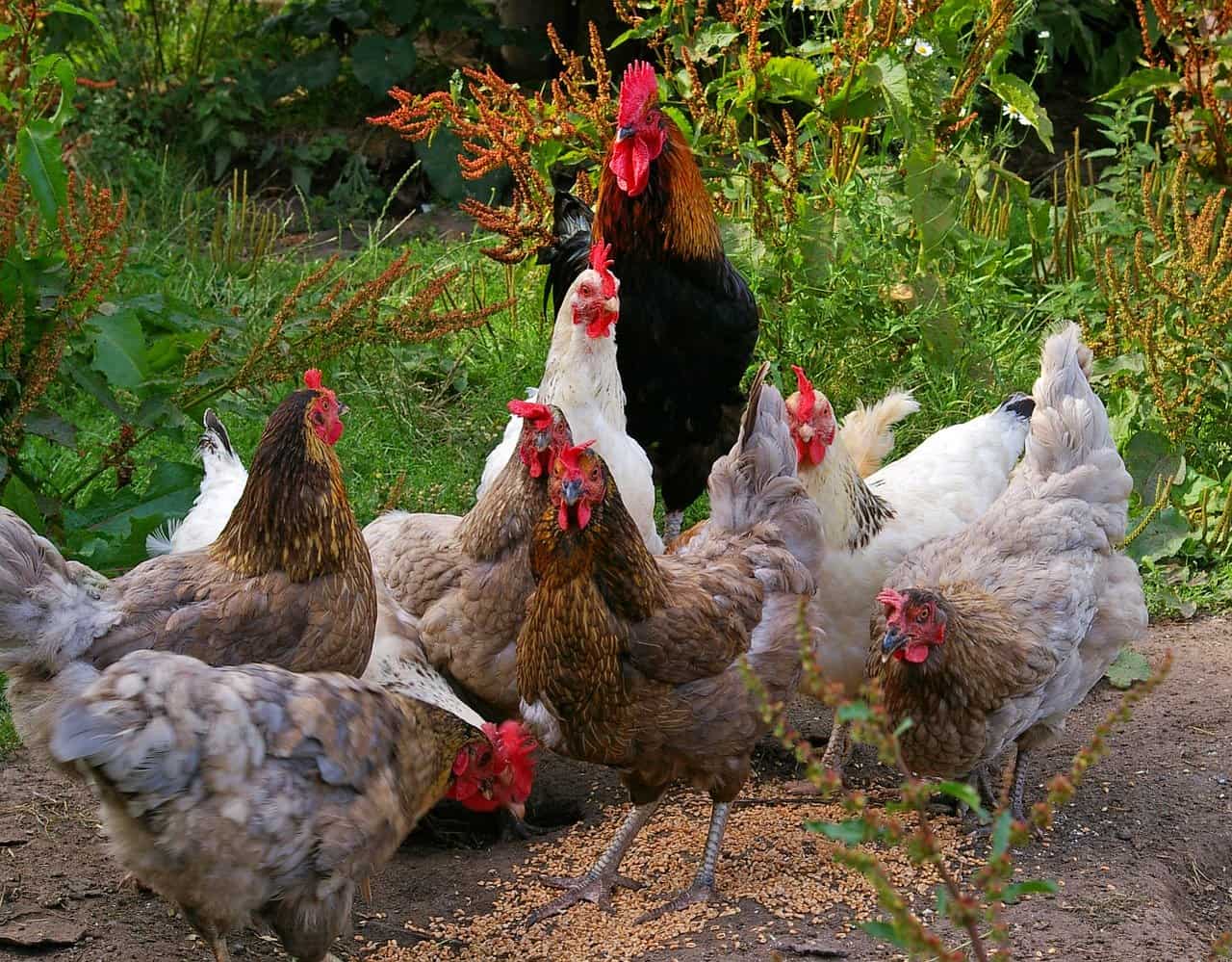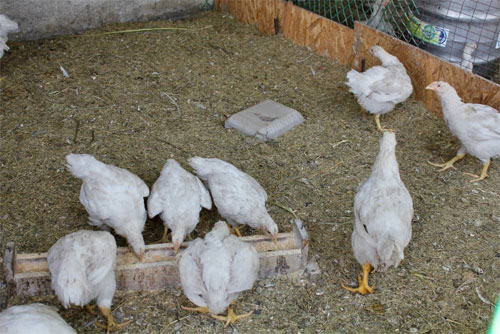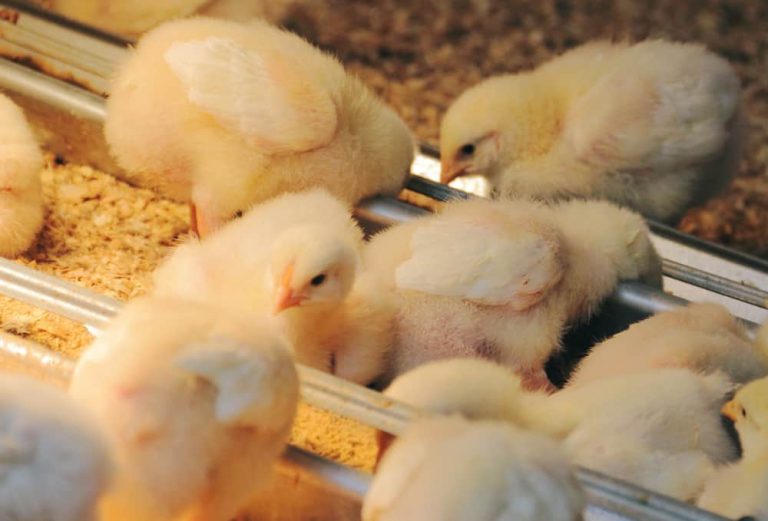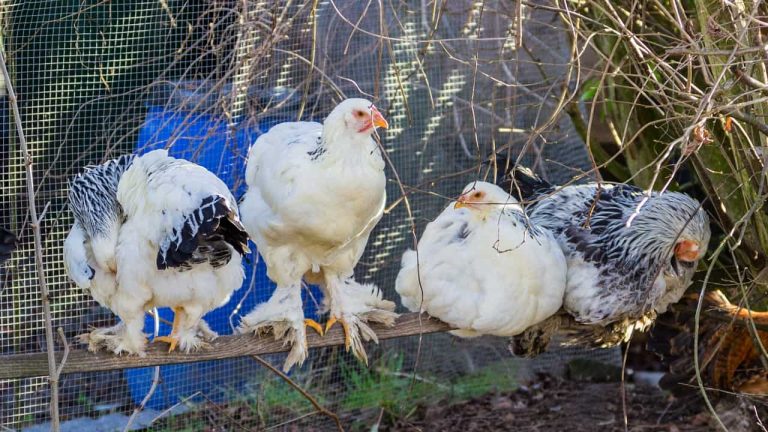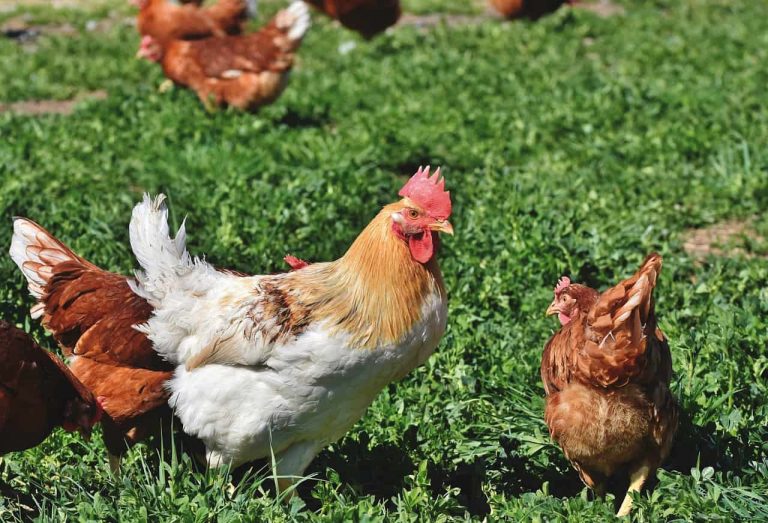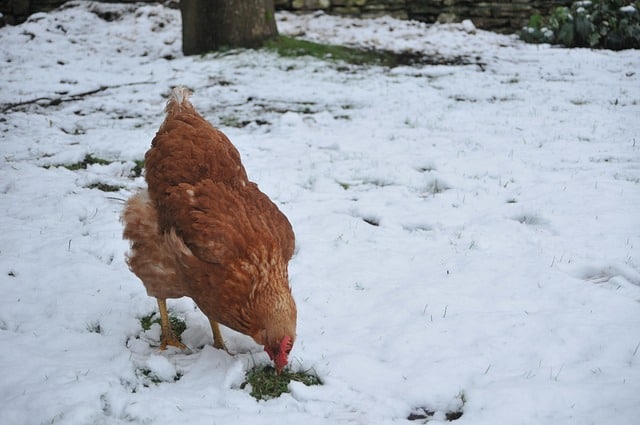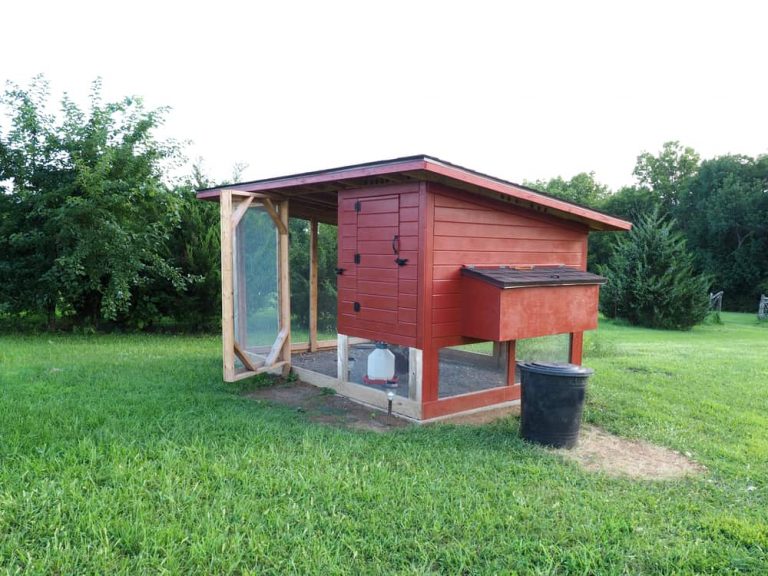What dietary needs do chickens have? This might be a question you might have asked yourself if you’re thinking of getting backyard chickens. If that’s so, you’ve ended up in the perfect place as it happens to be the topic of today’s post.
Read on to find out what the best diet for poultry is, how chickens’ nutritional requirements depend on their age and purpose, and how you can make your own chicken feed at home!
Contents
What should the ideal chicken diet look like?
All chickens should have their diet composed of the following essential things:
- Protein
The percentage of protein that chickens need largely depends on their age and their purpose. A starter diet almost always contains 23-25% protein, a grower diet has about 20%, and a finisher diet contains at least 17-18% of protein. Egg layers need about 16% of protein while meat birds need anything between 20-22%.
If you feed your poultry a homemade diet, you should make sure that you use legumes or fish meals to amount to the ideal protein content.
- Carbohydrates
Chickens can get carbs from table scraps (if you feed them rice and pasta, for example), but you should generally know those simple carbs aren’t that nutritious for chickens (or for humans, for that matter).
Complex carbs are available in grains, so a mix of wheat, corn, barley, oats, and others. These can make up to 60-70% of a chicken’s diet.
- Fats
Fats are essential for the development of the chickens’ nervous system. They support brain and nerve activity.
However, since they’re not as important as carbs and protein, in the long run, you can only provide them to your chickens by means of adding seeds — from sunflower seeds to sesame seeds, depending on what your birds enjoy. These should make up about 5% of their diet.
- Amino acids
You can add amino acids to your chickens’ diet by supplementation, but they’re usually available in foods like nuts, seeds, legumes and beans, dairy products, eggs, and fish meals.
- Vitamins and minerals
Vitamins and minerals come from fruit and vegetables, with the second being healthier and safer to feed to your chickens. Veggies don’t contain as much sugar, so they’re generally better.
If you have baby chicks, you might have to use some supplements so as to make sure that they get enough A, D3, E, and B12 in their diets.
What types of chicken feed are there?
The three most common kinds of chicken feed that are currently available are pellets, mash, and crumbles. These merely refer to how the food looks and how fine it is. They address different chicken ages, though.
Mash should be used for baby chickens while crumbles can be utilized to switch baby chicks to an adult chicken feed. Pellets should only be used for adults as they do not address the anatomy of younger chickens.
Chicken feed can be categorized also depending on the birds’ age that it is recommended for. Most of the starter feed available out there contains very high amounts of protein and calcium, so it would be unsuitable for adults.
There’s also the option of you choosing between broiler feed and layer feed once the chicks turn into adults. This all depends on whether you have meat birds or egg layers.
Finally, a chicken feed can be medicated or unmedicated, with the first usually containing treatment for preventing coccidiosis.
Different feed methods
The way you choose to feed your backyard chickens is up to you. Most people cannot devote hours to their birds, though, which is why they will resort to using an automatic feeder and an automatic waterer.
Regardless of the exact model of feeder that you will end up choosing, you should know that every chicken should get at least 1 to 1.5 pounds of food per week.
So, if you get the standard 6 chickens that all states allow you to buy, you’ll have to feed them anything between 6 and 9 pounds of food on a weekly basis. Getting back to the matter of feeding your birds, there are two main types of feeders out there:
- Automatic feeders
- Gravity feeders
The first is more expensive than the second, but they protect the chicken food better in that they are closed and only open up when a chicken comes around to feed. Therefore, automatic feeders save you money in the long run by way of not wasting food.
Gravity feeders are cheap and can even be made at home. However, not just your birds will have access to the food – wild birds will, too, and also rodents.
Healthy treats for your backyard chickens
If you’ve ever had pet birds, you might know that there are specially made treats for them, such as honey sticks or millet spray. Well, the same does not apply when it comes to chickens.
Some of the healthiest treats that they can enjoy are actually fruits. They aren’t supposed to get too much sugar in their diet, but every once in a while, you can throw them your fruit remnants (that includes the peels).
Here are some examples of treats that they can liberally enjoy risk-free:
- Fresh fruit such as melon, apples (without the seeds), apricots (without the pits)
- Pumpkin (including the seeds)
- Any kind of worms (mealworms are great as they increase their protein intake)
- Warm oatmeal (especially during the winter months)
What should you feed baby chickens?
It’s far easier to get your baby chicks started properly by using a commercial feed instead of a homemade one. Otherwise, you are going to have a hard time making sure that they get around 21-25% protein in their daily diet, but also more than enough calcium.
There is starter feed available, and it doesn’t cost that much, but you can always gradually replace it with your homemade chicken feed as your chicks grow up.
We are also cover an in-depth guide on what to feed your baby chicks.
What should you feed adult chickens?
Adult chickens can be split up into two main categories – meat chickens and egg-laying hens. Naturally, depending on what their purpose is, they are supposed to eat different things.
- Feeding meat chickens
Meat chickens need more protein compared to their egg-laying counterparts. That’s why you should aim at a protein content in their daily diet that exceeds 23%. If you get commercial chicken feed, make sure that it’s advertised for meat chickens.
- Feeding egg-laying hens
By contrast, egg-laying hens don’t have as high protein necessities, and they might actually be prone to developing gout if they get too much in their diet. Their daily protein needs are around 15-17% of their feed.
However, egg-laying hens need more calcium either by way of supplementation with commercial products or by you constantly adding the egg shells back into their diet.
Are table scraps OK?
In most cases, yes. But not all table scraps are safe, and for more information, make sure you check out the list of foods toxic to birds that we put together toward the end of the article.
If you tend to have a carb or grain-heavy diet, meaning that you regularly eat rice, pasta, oats, and wholegrain bread, you can safely feed your table scraps to your chickens.
The only word of caution, in this case, is that you shouldn’t add salt to your food if you want to start doing this. You can add salt when you’ve put food on your plate, but not as you prepare it in the pot.
Chop everything up so that it’s small and chicken-sized appropriate. Just make sure that before you begin doing this, you check your local legal regulations.
In some countries, such as the United Kingdom, it can be illegal to feed your table scraps to your backyard birds. It’s perfectly fine in others, though.
Here are some examples of kitchen scraps that are nutritious and healthy for chickens.
- Dairy products
- Small to moderate amounts of bread
- Cooked eggs
- Cereal, nuts, seeds, dried fruit
- Pumpkin
- Pasta, rice, pizza leftovers
- Various types of pet food
How to make your own chicken feed
Making your own chicken feed is a great idea as you will know for sure what you put into the recipe. Your chickens aren’t going to be exposed to a variety of pesticides, additives, preservatives, or whatever else commercial chicken feeds might contain.
Here is a simple recipe formula that you can use.
- 30% corn
- 30% wheat, barley, oats, or other types of grains
- 20% lentils or peas
- 10% fish meal
- Up to 2-5% sunflower seeds
- ¼ cup kelp granules
- ½ cup brewer’s yeast
- 1 cup of flax seeds
- ½ cup grit and a couple of spoons of ground egg shells
- Small amounts of berries or whatever seedless and safe fruit you have available
Chickens need about 17% of the protein in their daily diet, which means that you’ll have to do your best at supplying it through legumes (such as the lentils or peas that we have mentioned) or seeds.
Black sunflower seeds are the richest in the protein of all, but they also contain a bit too much fat, so they should be given in limited amounts.
Do my chickens need grit?
Yes. Chickens, doves, pigeons, and a variety of other birds require fine grit to be able to digest food properly. While it might be true that chickens peck on a range of things in and out of their coops, they don’t really have access to sand, oyster shells, or grit that much.
You’ll be glad to know that grit doesn’t cost a fortune and that it is available at most stores around you or online. Some types of chicken feed can contain grit that’s been pre-added to the mix.
As for the oyster shell, you might have heard that you should add this to your birds’ diet, too. The reason for this is that egg-laying hens have different calcium necessities than roosters or meat chickens.
If oyster shells aren’t something you want to invest in, you can simply collect the shells of the eggs you use and grind them up into a fine powder. It’s rich in calcium and it’s also completely natural and sustainable since it comes from your backyard.
What should my chickens drink?
The answer to this question is very straightforward. Chickens should only drink water. Changing your chicken’s water needs to happen at least once a day, and when it’s warm outside, you might have to do that twice or three times a day.
Plus, the water can sometimes get dirty if your chickens aren’t paying attention, so changing it in the morning and in the evening can make sure that they always have access to fresh and clean water.
If you don’t want to add any fruits or vegetables into your chickens’ diet to provide them with vitamins and minerals, there are vitamin and mineral supplements that you can add to their water.
Talk to your vet about this — most chickens need vitamin A, D3, and E supplementation, especially while growing up.
What you should NEVER feed chickens
There are some foods that are best avoided when it comes to feeding backyard chickens. Some of these can cause potentially lethal health problems, such as chocolate, which is dangerous for a variety of farm animals and pets.
Here is a list of foods that you should always avoid giving your flock.
- Eggplant and uncooked potatoes
These two contain a dangerous substance called solanine, which can cause intoxication in many farm animals, including birds.
- Coffee grounds
Coffee doesn’t offer your chickens any nutrition and it makes them unnecessarily agitated.
- Chocolate
It contains theobromine, a potentially deadly substance that causes intoxication in birds and a wide range of other animals. Besides theobromine, some varieties can contain xylitol, an artificial sweetener, which is also dangerous to animals.
- Onions and garlic
These two have been linked to cases of hemolytic anemia in backyard chickens, so they are a no-go. However, you can feed them in small amounts if they’re basically ingredients of your table scraps.
- Green tomatoes
Similar to other plants, green tomatoes contain solanine, which is toxic to many animals, from pigs to backyard birds.
- Citrus
While some chickens are known to like a bit of orange once in a while, the fact is that citrus fruit can be dangerous as some types are highly acidic and cause digestive imbalances. Plus, you’d have to remove all the seeds to eliminate any choking hazard.
- Avocados
As healthy as you might think they are for humans, avocados contain ‘persin’, a substance that is known to be toxic and even deadly to birds. The flesh is dangerous, but the pit and the skin are practically lethal.
- Fruits that can contain pesticides
Fruits are great if you want to give your chickens a treat once in a while, but some of them can be downright dangerous due to how likely it is for them to have been exposed to pesticides.
Do a bit of research online on the so-called ‘Dirty Dozen’ to find out what fruit you should avoid feeding your birds.
- Apple seeds
You might not know this, but apple seeds contain cyanide, which is toxic to small animals and birds, including chickens.
- Alcoholic beverages
These have no nutritional value whatsoever and they can cause a variety of neurologic problems and strange behaviors, which might otherwise affect the rest of the flock.
- Salty or sugary foods
Too much salt can cause severe cardiovascular imbalances whereas sugar can create digestive distress and other health issues, too. The only sugar and salt that chickens are supposed to get are from fruit, vegetables, and herbs.
What can happen if you don’t properly feed your chickens?
If your birds don’t get the right nutrition, they are at a high risk of developing a variety of diseases. For instance, if you feed your chickens too much protein, which might be necessary if they are raised for meat, they have a high risk of developing gout.
If you don’t feed enough calcium to baby chicks and egg-laying eggs, they might not grow into healthy and happy adults, or they might lay eggs with a fragile shell, for example.
Plus, these days, there are so many options when it comes to chicken feed that you virtually have no excuse for not feeding them properly. You can get it fully pre-made or make it at home with natural ingredients.

